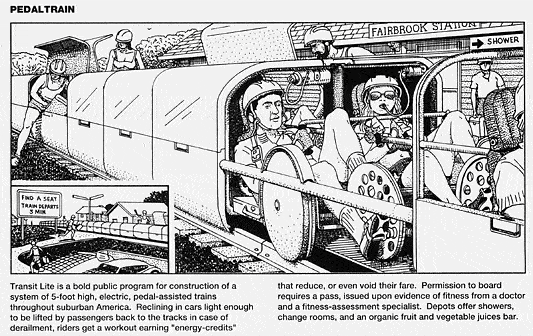I suspect many readers have seen Neil Gershenfeld’s TED talk on fab labs, or read his book. In particular, notice the part where he comments that fabs are following the track of computers, currently in the minicomputer stage. You can see the same progression in my keynote for a SME meeting a couple of years ago (slides pdf), but I use the progression from film to instant to digital photography instead of computing.
In both cases we get to nanofactories in about 20 years.
There’s a nice post up at the NY Times by Allison Arieff about the whimsical but compelling ideas of Steven M. Johnson (h/t Kurzweilai.net) whom she describes as an “inventor/author/cartoonist/former urban planner … a sort of R. Crumb meets R. Buckminster Fuller (and the post actually got a comment from Fuller’s daughter).

What caught my eye was this quote from Johnson:
“America has been falling into a depression, a psychological depression, for many years. Yet this is a land of pioneer inventors. It annoys me that an untrained person like myself can think up products easily (in fact I usually spend energy ‘turning off’ the idea-generating machine just as psychics train themselves to turn off their capability) and yet the nation seems to sit helplessly passive and wait to be saved somehow.”
… which resonates strongly with my notion that it’s the gloom-and-doom defeatism that is our only real problem.
Who would have thought, in the 1970s when I was building an Altair 8800 in my dorm room, that by 2010 the volume of publication by people typing into blogs (whats?) on personal computers would exceed that of the print and broadcast industries? Indeed, I had a hard time being taken seriously by my friends when I predicted that in 2000, the average office worker woud use an individual computer. It’s no real stretch to imagine the next two decades paralleling the 80s’ and 90s’ development of PCs and a significant proportion of manufactured goods being home-fabbed (and individually customized if not completely novel) by 2030.